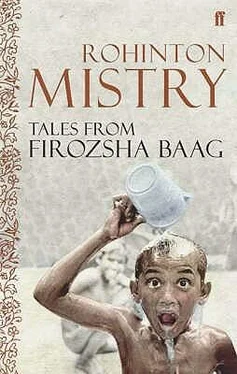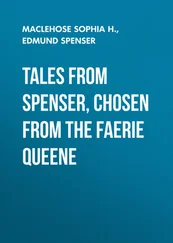Rohinton Mistry - Tales From Firozsha Baag
Здесь есть возможность читать онлайн «Rohinton Mistry - Tales From Firozsha Baag» весь текст электронной книги совершенно бесплатно (целиком полную версию без сокращений). В некоторых случаях можно слушать аудио, скачать через торрент в формате fb2 и присутствует краткое содержание. Год выпуска: 2006, Издательство: Faber & Faber, Жанр: Современная проза, на английском языке. Описание произведения, (предисловие) а так же отзывы посетителей доступны на портале библиотеки ЛибКат.
- Название:Tales From Firozsha Baag
- Автор:
- Издательство:Faber & Faber
- Жанр:
- Год:2006
- ISBN:нет данных
- Рейтинг книги:3 / 5. Голосов: 1
-
Избранное:Добавить в избранное
- Отзывы:
-
Ваша оценка:
- 60
- 1
- 2
- 3
- 4
- 5
Tales From Firozsha Baag: краткое содержание, описание и аннотация
Предлагаем к чтению аннотацию, описание, краткое содержание или предисловие (зависит от того, что написал сам автор книги «Tales From Firozsha Baag»). Если вы не нашли необходимую информацию о книге — напишите в комментариях, мы постараемся отыскать её.
Tales From Firozsha Baag — читать онлайн бесплатно полную книгу (весь текст) целиком
Ниже представлен текст книги, разбитый по страницам. Система сохранения места последней прочитанной страницы, позволяет с удобством читать онлайн бесплатно книгу «Tales From Firozsha Baag», без необходимости каждый раз заново искать на чём Вы остановились. Поставьте закладку, и сможете в любой момент перейти на страницу, на которой закончили чтение.
Интервал:
Закладка:
Maybe the old man is not well, it’s an emergency. But I quickly scrap that thought — this isn’t Bombay, an ambulance would have arrived. They’re probably taking him out for a ride. If he is his son, where has he been all this time, I wonder.
The old man finally settles in the front seat, the wheelchair goes in the trunk, and they’re off. The one I think is the son looks up and catches me at the window before I can move away, so I wave, and he waves back.
In the afternoon I take down a load of clothes to the laundry room. Both machines have completed their cycles, the clothes inside are waiting to be transferred to dryers. Should I remove them and place them on top of a dryer, or wait? I decide to wait. After a few minutes, two women arrive, they are in bathrobes, and smoking. It takes me a while to realize that these are the two disappointments who were sunbathing in bikinis last summer.
“You didn’t have to wait, you could have removed the clothes and carried on, dear,” says one. She has a Scottish accent. It’s one of the few I’ve learned to identify. Like maple leaves.
“Well,” I say, “some people might not like strangers touching their clothes.”
“You’re not a stranger, dear,” she says, “you live in this building, we’ve seen you before.”
“Besides, your hands are clean,” the other one pipes in. “You can touch my things any time you like.”
Horny old cow. I wonder what they’ve got on under their bathrobes. Not much, I find, as they bend over to place their clothes in the dryers.
“See you soon,” they say, and exit, leaving me behind in an erotic wake of smoke and perfume and deep images of cleavages. I start the washers and depart, and when I come back later, the dryers are empty.
PW tells me, “The old man’s son took him out for a drive today. He has a big beautiful black car.”
I see my chance, and shoot back: “Olds Ninety-Eight.”
“What?”
“The car,” I explain, “it’s an Oldsmobile Ninety-Eight.”
She does not like this at all, my giving her information. She is visibly nettled, and retreats with a sour face.
Mother and Father read the first five stories, and she was very sad after reading some of them, she said he must he so unhappy there, all his stories are about Bombay, he remembers every little thing about his childhood, he is thinking about it all the time even though he is ten thousand miles away, my poor son, I think he misses his home and us and everything he left behind, because if he likes it over there why would he not write stories about that, there must be so many new ideas that his new life could give him .
But Father did not agree with this, he said it did not mean that he was unhappy, all writers worked in the same way, they used their memories and experiences and made stories out of them, changing some things, adding some, imagining some, all writers were very good at remembering details of their lives .
Mother said, how can you be sure that he is remembering because he is a writer, or whether he started to write because he is unhappy and thinks of his past, and wants to save it all by making stories of it; and Father said that is not a sensible question, anyway, it is now my turn to read the next story .
The first snow has fallen, and the air is crisp. It’s not very deep, about two inches, just right to go for a walk in. I’ve been told that immigrants from hot countries always enjoy the snow the first year, maybe for a couple of years more, then inevitably the dread sets in, and the approach of winter gets them fretting and moping. On the other hand, if it hadn’t been for my conversation with the woman at the swimming registration desk, they might now be saying that India is a nation of non-swimmers.
Berthe is outside, shovelling the snow off the walkway in the parking lot. She has a heavy, wide pusher which she wields expertly.
The old radiators in the apartment alarm me incessantly. They continue to broadcast a series of variations on death throes, and go from hot to cold and cold to hot at will, there’s no controlling their temperature. I speak to Berthe about it in the lobby. The old man is there too, his chin seems to have sunk deeper into his chest, and his face is a yellowish grey.
“Nothing, not to worry about anything,” says Berthe, dropping rough-hewn chunks of language around me. “Radiator no work, you tell me. You feel cold, you come to me, I keep you warm,” and she opens her arms wide, laughing. I step back, and she advances, her breasts preceding her like the gallant prows of two ice-breakers. She looks at the old man to see if he is appreciating the act: “You no feel scared, I keep you safe and warm.”
But the old man is staring outside, at the flakes of falling snow. What thoughts is he thinking as he watches them? Of childhood days, perhaps, and snowmen with hats and pipes, and snowball fights, and white Christmases, and Christmas trees? What will I think of, old in this country, when I sit and watch the snow come down? For me, it is already too late for snowmen and snowball fights, and all I will have is thoughts about childhood thoughts and dreams, built around snowscapes and winter-wonderlands on the Christmas cards so popular in Bombay; my snowmen and snowball fights and Christmas trees are in the pages of Enid Blyton’s books, dispersed amidst the adventures of the Famous Five, and the Five Find-Outers, and the Secret Seven. My snowflakes are even less forgettable than the old man’s, for they never melt. It finally happened. The heat went. Not the usual intermittent coming and going, but out completely. Stone cold. The radiators are like ice. And so is everything else. There’s no hot water. Naturally. It’s the hot water that goes through the rads and heats them. Or is it the other way around? Is there no hot water because the rads have stopped circulating it? I don’t care, I’m too cold to sort out the cause and effect relationship. Maybe there is no connection at all.
I dress quickly, put on my winter jacket, and go down to the lobby. The elevator is not working because the power is out, so I take the stairs. Several people are gathered, and Berthe has announced that she has telephoned the office, they are sending a man. I go back up the stairs. It’s only one floor, the elevator is just a bad habit. Back in Firozsha Baag they were broken most of the time. The stairway enters the corridor outside the old man’s apartment, and I think of his cold feet and hands. Poor man, it must be horrible for him without heat.
As I walk down the long hallway, I feel there’s something different but can’t pin it down. I look at the carpet, the ceiling, the wallpaper: it all seems the same. Maybe it’s the freezing cold that imparts a feeling of difference.
PW opens her door: “The old man had another stroke yesterday. They took him to the hospital.”
The medicinal smell. That’s it. It’s not in the hallway any more.
In the stories that he’d read so far Father said that all the Parsi families were poor or middle-class, but that was okay; nor did he mind that the seeds for the stories were picked from the sufferings of their own lives; but there should also have been something positive about Parsis, there was so much to be proud of: the great Tatas and their contribution to the steel industry, or Sir Dinshaw Petit in the textile industry who made Bombay the Manchester of the East, or Dadabhai Naoroji in the freedom movement, where he was the first to use the word swaraj, and the first to be elected to the British Parliament where he carried on his campaign; he should have found some way to bring some of these wonderful facts into his stories, what would people reading these stories think, those who did not know about Parsis — that the whole community was full of cranky, bigoted people; and in reality it was the richest, most advanced and philanthropic community in India, and he did not need to tell his own son that Parsis had a reputation for being generous and family-oriented. And he could have written something also about the historic background, how Parsis came to India from Persia because of Islamic persecution in the seventh century, and were the descendants of Cyrus the Great and the magnificent Persian Empire. He could have made a story of all this, couldn’t he?
Читать дальшеИнтервал:
Закладка:
Похожие книги на «Tales From Firozsha Baag»
Представляем Вашему вниманию похожие книги на «Tales From Firozsha Baag» списком для выбора. Мы отобрали схожую по названию и смыслу литературу в надежде предоставить читателям больше вариантов отыскать новые, интересные, ещё непрочитанные произведения.
Обсуждение, отзывы о книге «Tales From Firozsha Baag» и просто собственные мнения читателей. Оставьте ваши комментарии, напишите, что Вы думаете о произведении, его смысле или главных героях. Укажите что конкретно понравилось, а что нет, и почему Вы так считаете.












